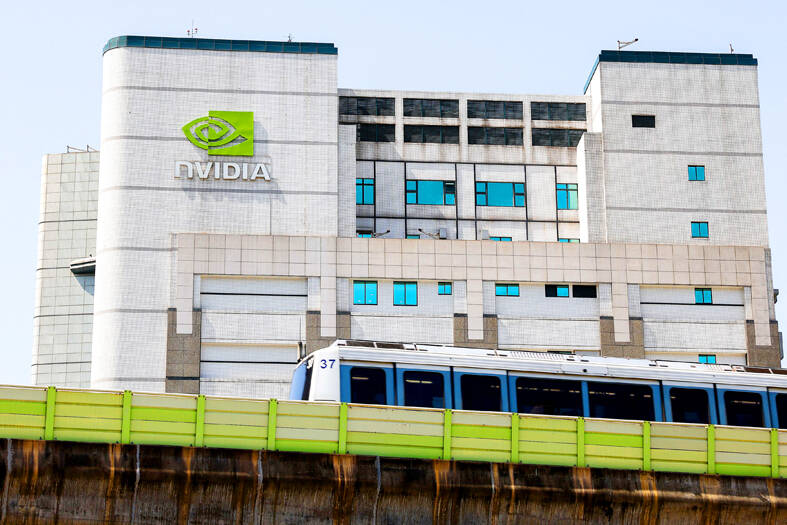US President Donald Trump’s administration has barred Nvidia Corp from selling its H20 chip in China, an escalation of Washington’s technology battle with Beijing that the company said would cost it billions of dollars and hamstring a product line it explicitly designed to comply with previous US curbs.
The US government on Monday informed Nvidia that the H20 would require a license to export to China “for the indefinite future.”
The rules address Washington’s concerns that “the covered products may be used in, or diverted to, a supercomputer in China,” the company said in a filing on Tuesday.

Photo: Ann Wang, Reuters
Nvidia said it would report about US$5.5 billion in write-downs during the current quarter, tied to inventory and commitments for the chip.
Nvidia’s shares yesterday fell 5.8 percent in premarket trading, while shares in rival chipmaker Advanced Micro Devices Inc (AMD) dropped 6.5 percent.
Asian tech giants also saw big declines. Taiwan Semiconductor Manufacturing Co (TSMC, 台積電) dropped 2.51 percent in Taipei, and testing equipment maker Advantest Co’s shares fell 6.7 percent and Disco Corp lost 7.6 percent in Tokyo. South Korean chipmakers Samsung Electronics Co and SK Hynix Inc were down by about 3 percent.
“An increase in US-China trade tensions prompted investors in the region to dump their stocks,” Moore Securities Investment Consulting Co (摩爾投顧) analyst Adam Lin (林漢偉) said, referring to the latest US Department of Commerce actions to impose export restrictions on Nvidia’s H20 and AMD’s MI308 chips, which are critical to artificial intelligence (AI) development.
“TSMC also remained concerned by the Trump administration’s threat to tariff semiconductors,” Lin said.
The new restrictions are among the clearest signs yet that Trump would stay the course on Washington’s efforts to limit China’s semiconductor and AI ambitions.
US officials first barred Nvidia and other AI chipmakers from selling their most advanced models to China in October 2022, over concerns that the technology could give Beijing a military edge. Since then, the China controls have ballooned to include an increasingly large set of semiconductor manufacturing tools, as well as a wider range of processors and high-bandwidth memory chips, which are essential for AI applications.
The news of the new controls came after US Senator Elizabeth Warren urged US Secretary of Commerce Howard Lutnick to impose restrictions on exports of Nvidia’s H20 and other advanced AI chips to China.
“I write with great concern regarding reports that the Commerce Department has paused its plan to restrict the export of powerful advanced AI chips like Nvidia’s H20 to the People’s Republic of China,” Warren wrote in a letter posted on the Web site of the US Senate’s Committee on Banking, Housing and Urban Affairs.
Former US president Joe Biden had not included the H20 chips in controls his administration placed on exports of advanced AI chips, it said.
The restrictions follow Nvidia’s announcement on Monday that it would build up to US$500 billion of AI infrastructure in the US over the next four years.
Additional reporting by CNA and AP

Sweeping policy changes under US Secretary of Health and Human Services Robert F. Kennedy Jr are having a chilling effect on vaccine makers as anti-vaccine rhetoric has turned into concrete changes in inoculation schedules and recommendations, investors and executives said. The administration of US President Donald Trump has in the past year upended vaccine recommendations, with the country last month ending its longstanding guidance that all children receive inoculations against flu, hepatitis A and other diseases. The unprecedented changes have led to diminished vaccine usage, hurt the investment case for some biotechs, and created a drag that would likely dent revenues and

Global semiconductor stocks advanced yesterday, as comments by Nvidia Corp chief executive officer Jensen Huang (黃仁勳) at Davos, Switzerland, helped reinforce investor enthusiasm for artificial intelligence (AI). Samsung Electronics Co gained as much as 5 percent to an all-time high, helping drive South Korea’s benchmark KOSPI above 5,000 for the first time. That came after the Philadelphia Semiconductor Index rose more than 3 percent to a fresh record on Wednesday, with a boost from Nvidia. The gains came amid broad risk-on trade after US President Donald Trump withdrew his threat of tariffs on some European nations over backing for Greenland. Huang further

CULPRITS: Factors that affected the slip included falling global crude oil prices, wait-and-see consumer attitudes due to US tariffs and a different Lunar New Year holiday schedule Taiwan’s retail sales ended a nine-year growth streak last year, slipping 0.2 percent from a year earlier as uncertainty over US tariff policies affected demand for durable goods, data released on Friday by the Ministry of Economic Affairs showed. Last year’s retail sales totaled NT$4.84 trillion (US$153.27 billion), down about NT$9.5 billion, or 0.2 percent, from 2024. Despite the decline, the figure was still the second-highest annual sales total on record. Ministry statistics department deputy head Chen Yu-fang (陳玉芳) said sales of cars, motorcycles and related products, which accounted for 17.4 percent of total retail rales last year, fell NT$68.1 billion, or

HSBC Bank Taiwan Ltd (匯豐台灣商銀) and the Taiwan High Prosecutors Office recently signed a memorandum of understanding (MOU) to enhance cooperation on the suspicious transaction analysis mechanism. This landmark agreement makes HSBC the first foreign bank in Taiwan to establish such a partnership with the High Prosecutors Office, underscoring its commitment to active anti-fraud initiatives, financial inclusion, and the “Treating Customers Fairly” principle. Through this deep public-private collaboration, both parties aim to co-create a secure financial ecosystem via early warning detection and precise fraud prevention technologies. At the signing ceremony, HSBC Taiwan CEO and head of banking Adam Chen (陳志堅)